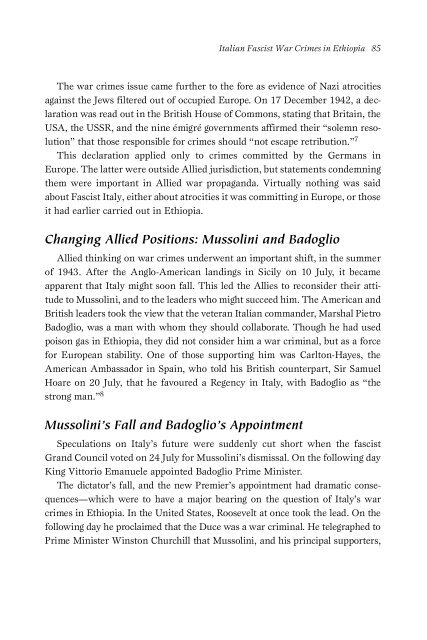Italian Fascist War Crimes in Ethiopia - Societa italiana di storia ...
Italian Fascist War Crimes in Ethiopia - Societa italiana di storia ...
Italian Fascist War Crimes in Ethiopia - Societa italiana di storia ...
Create successful ePaper yourself
Turn your PDF publications into a flip-book with our unique Google optimized e-Paper software.
<strong>Italian</strong> <strong>Fascist</strong> <strong>War</strong> <strong>Crimes</strong> <strong>in</strong> <strong>Ethiopia</strong> 85<br />
The war crimes issue came further to the fore as evidence of Nazi atro c i t i e s<br />
aga<strong>in</strong>st the Jews filtered out of occupied Euro p e. On 17 December 1942, a decl<br />
a ration was read out <strong>in</strong> the British House of Commons, stat<strong>in</strong>g that Brita<strong>in</strong>, the<br />
U SA, the USSR, and the n<strong>in</strong>e émigré governments affirmed their “solemn re s o-<br />
lution” that those responsible for crimes should “not escape re t r i b u t i o n . ” 7<br />
This declaration applied only to crimes committed by the Germans <strong>in</strong><br />
Europe. The latter were outside Allied juris<strong>di</strong>ction, but statements condemn<strong>in</strong>g<br />
them were important <strong>in</strong> Allied war propaganda. Virtually noth<strong>in</strong>g was said<br />
about <strong>Fascist</strong> Italy, either about atrocities it was committ<strong>in</strong>g <strong>in</strong> Europe, or those<br />
it had earlier carried out <strong>in</strong> <strong>Ethiopia</strong>.<br />
Chang<strong>in</strong>g Allied Positions: Mussol<strong>in</strong>i and Badoglio<br />
Allied th<strong>in</strong>k<strong>in</strong>g on war crimes underwent an important shift, <strong>in</strong> the summer<br />
of 1943. After the Anglo-American land<strong>in</strong>gs <strong>in</strong> Sicily on 10 July, it became<br />
a p p a rent that Italy might soon fall. This led the Allies to reconsider their attitude<br />
to Mussol<strong>in</strong>i, and to the leaders who might succeed him. The American and<br />
British leaders took the view that the ve t e ran <strong>Italian</strong> commander, Marshal Pietro<br />
Badoglio, was a man with whom they should collabora t e. Though he had used<br />
poison gas <strong>in</strong> <strong>Ethiopia</strong>, they <strong>di</strong>d not consider him a war crim<strong>in</strong>al, but as a forc e<br />
for European stability. One of those support<strong>in</strong>g him was Carlton-Hayes, the<br />
American Ambassador <strong>in</strong> Spa<strong>in</strong>, who told his British counterpart, Sir Samuel<br />
H o a re on 20 July, that he favo u red a Re g e n cy <strong>in</strong> Italy, with Badoglio as “the<br />
s t rong man.” 8<br />
Mussol<strong>in</strong>i’s Fall and Badoglio’s Appo<strong>in</strong>tment<br />
Speculations on Italy’s future were suddenly cut short when the fascist<br />
Grand Council voted on 24 July for Mussol<strong>in</strong>i’s <strong>di</strong>smissal. On the follow<strong>in</strong>g day<br />
K<strong>in</strong>g Vittorio Emanuele appo<strong>in</strong>ted Badoglio Prime M<strong>in</strong>ister.<br />
The <strong>di</strong>ctator’s fall, and the new Premier’s appo<strong>in</strong>tment had dramatic consequences—which<br />
we re to have a major bear<strong>in</strong>g on the question of Italy’s wa r<br />
crimes <strong>in</strong> <strong>Ethiopia</strong>. In the United States, Ro o s evelt at once took the lead. On the<br />
f o l l ow<strong>in</strong>g day he proclaimed that the Duce was a war crim<strong>in</strong>al. He telegraphed to<br />
Prime M<strong>in</strong>ister W<strong>in</strong>ston Churchill that Mussol<strong>in</strong>i, and his pr<strong>in</strong>cipal supporters,

















